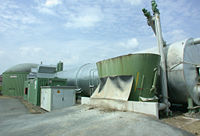
Photo from wikipedia
Many African countries have vast biomass resources that could serve as feedstock for methane production through the adoption of commercial biogas plants. However, due to many inhibiting factors, these resources… Click to show full abstract
Many African countries have vast biomass resources that could serve as feedstock for methane production through the adoption of commercial biogas plants. However, due to many inhibiting factors, these resources are under-utilised. This article reviews commercial biogas systems that treat organic waste from municipalities, large livestock farms, large plantations/crop farms, food/beverage production facilities, and other industries, to identify essential lessons which African countries could use to develop/disseminate such biogas systems. The review identified the critical barriers to commercial biogas development to be high initial capital costs, weak environmental policies, poor institutional framework, poor infrastructure and a general lack of willpower to implement renewable energy policies and set challenging targets. In African countries where feed-in-tariffs, quota obligations and competitive bidding programmes have been instituted, implementation has been poor, and most state-owned utilities have been unsupportive. Using knowledge from more experienced countries such as Germany and China, some key lessons have were identified. Among the key lessons is the need to institute and enforce environmental management policies to ensure that waste from medium and large livestock farms and industries are not disposed of indiscriminately, a tool China has recently used to promote commercial biogas plants to a high degree of success.
Journal Title: Energies
Year Published: 2018
Link to full text (if available)
Share on Social Media: Sign Up to like & get
recommendations!